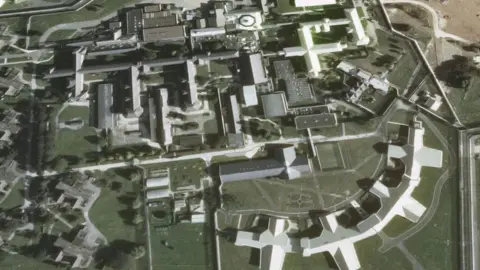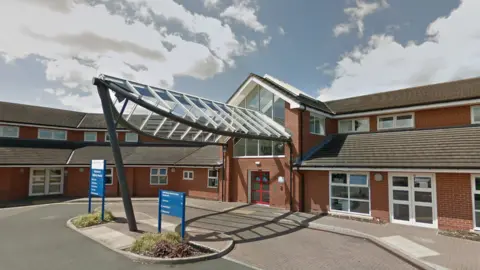Nottingham attacks: 'Ongoing concerns' at trust that treated killer
 Google
GoogleA government-ordered rapid review prompted by the Nottingham attacks has found "enduring areas of concern" at a mental health trust.
The Care Quality Commission (CQC) said there were continuing issues over care and patient safety at Nottinghamshire Healthcare NHS Foundation Trust.
It also said it has had concerns about Rampton Hospital for nearly five years.
The review of the trust, which treated triple killer Valdo Calocane, was ordered after the attacks in June.
Health Secretary Victoria Atkins called for the review after Calocane was given a hospital order for the killings in January.
The CQC has now published two parts of that review - an assessment of patient safety at the trust, and an assessment of progress made at Rampton high-security hospital.
A third part, on Calocane's care by the trust, will be published in the summer.
Chris Dzikiti, the CQC's director of mental health, said: "While we found some improvements, our review of Nottinghamshire Healthcare NHS Foundation Trust highlights ongoing concerns around people's care and safety.
"We have set out clear recommendations for action the trust needs to take so that services provide safe care and treatment, and to protect patients, families and the public from the risk of harm."
 Nottinghamshire Police
Nottinghamshire PoliceMs Atkins added: "The Care Quality Commission has found failings in the Nottinghamshire Healthcare NHS Foundation Trust's ability to manage demand for services, access to care, staffing, and issues of leadership. This is not acceptable, and action must be taken.
"Since I commissioned the review, an improvement director has been appointed, and a plan is being developed with the trust and NHS England to improve services. The trust will now have the highest degree of national oversight."
The CQC said the rapid review identified three "enduring areas of concern" at the trust, which were demand for services and access to care, staffing and leadership.
The watchdog has also recommended that Rampton - one of three high-security hospitals in England and Wales - is relicensed for a period of no more than 12 months - rather than the usual five years - during which further assessment activity will continue.
It has also told Rampton to stop using employees to "prop up" other areas, such as therapy and education staff who were being used to increase nursing numbers.
On top of this, it said Rampton should be paired with another high-secure hospital as a "critical friend".

In five inspections since July 2019, Rampton has not received a rating above "requires improvement".
The CQC noted that while care at the hospital had improved since previous inspections, gaps and challenges need to be addressed.
A previously-noted culture of bullying and verbal and/or racist abuse at Rampton had improved, the report said, but had not been eradicated, with two patients reporting that staff had made derogatory comments about their weight or physical health issues.
However, the CQC said it must be accepted that other community mental health services were facing many of the same challenges as the trust.
National spotlight
The review also examined the wider performance of the trust.
Areas of concern included the waiting lists of local mental health teams - standing at 1,233 people at the time of the review.
It also found the trust's crisis teams did not always respond to people's immediate needs to minimise any discomfort, concern, or distress, and did not always treat people quickly.
"Inappropriate" placements - in which patients are placed far from home - more than doubled from 152 to 420 between 2022 and 2023, the CQC found.
The report comes after a series of damning revelations involving the trust.
In January, a coroner called for action over the death of Tammy Watkins after she died nearly three months after swallowing a crayon.
Soon after, more than 30 staff across the trust were suspended over separate allegations of staff misconduct, while Rampton was rated as inadequate following an inspection in June and July.
In March, the CQC found examples of staff falsifying records and assaulting patients at the trust, and in the same month, the inquest of patient Steven Parkin found his death at Highbury Hospital was contributed to by neglect, adding he was "failed at every level".
But the service was put in the national spotlight when it emerged Calocane had been in its care several times.
His mental illness began in 2019, a court heard, and he had been detained under the Mental Health Act at a psychiatric unit in Nottingham four times since May 2020.
On each occasion, he was discharged - the final time in February 2022, more than a year before the killings.
 Google
GoogleResponding to the review, the trust said a number of improvements were already in place, including dozens of extra staff, a full risk assessment on all people waiting for treatment and an upgraded crisis line phone system.
Ifti Majid, the trust's chief executive, said: "We are committed to providing high quality, effective and safe care to those people who need it most, and that is why this report makes difficult reading because it is clear that sometimes we have let down patients and their families and for this, we are truly sorry.
"External inspections are an important way of helping us learn and make the improvements that are needed."

Follow BBC East Midlands on Facebook, on X, or on Instagram. Send your story ideas to [email protected] or via WhatsApp on 0808 100 2210.
